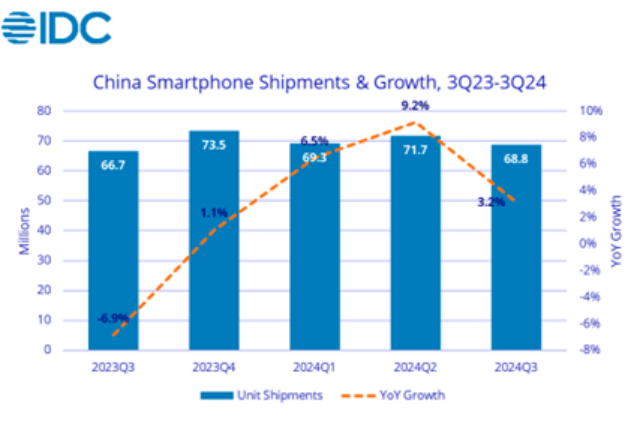IDC’s China Smartphone Market Share report showed that Huawei sold more phones in the country as Apple loses its presence in the third quarter of 2024.

key insights
China’s smartphone shipments increased by 3.2% year-on-year to 68.8 million units in the second quarter of 2024.
Vivo is the leader in the Chinese smartphone market, with a share of 18.6 percent in Q3 2024, compared to 15.8 percent in Q3 2023.
This growth suggests that strategies with clear product positioning and targeting different market segments (premium and budget) are effective.
Apple is in second place with a share of 15.6% vs. 16.1%.
Huawei’s share increased from 11.1% to 15.3%.
Xiaomi’s market share is 14.8 percent versus 13.6 percent. Honor’s market share is 14.6 percent versus 19.4 percent.
huawei
Huawei’s growth in China’s market share reflects a comeback after years of challenges. The main factors that contributed to its success are:
Huawei has recorded double-digit growth for four consecutive quarters, confirming the company’s strong comeback in China’s smartphone market. This indicates continued consumer interest in Huawei’s products.
Huawei’s success is primarily due to innovative product releases, especially in the foldable phone market. The company launched the world’s first tri-fold mobile phone, which has garnered significant attention from consumers and is expected to play a pivotal role in shaping the future of folding devices in the market. By pushing forward with cutting-edge technology, Huawei has been able to differentiate itself from its competitors.
Like other Chinese OEMs, Huawei has benefited from a wave of pent-up demand that has built up over the past three years. As consumers look to upgrade their devices, Huawei’s strong product portfolio is well-positioned to capture a large portion of these buyers.
Huawei, along with other Chinese OEMs such as Vivo and Xiaomi, has contributed to the 3.8% growth in the Android smartphone market. The brand’s solid performance in the Android ecosystem continues to strengthen its foothold in the domestic market.
Overall, Huawei’s strategic focus on innovation, responding to consumer demand for advanced features such as foldable devices, and leveraging the growing momentum in China’s smartphone market all contributed to impressive market share growth. I’m doing it.
apple
Despite re-entering China’s top five smartphone companies with the launch of the iPhone 16 series, Apple faces challenges leading to a decline in market share. There are several important factors that explain this loss.
Apple’s market share is influenced by the strong performance of local Chinese manufacturers such as Vivo, Huawei, and Xiaomi. These companies achieved double-digit growth primarily due to innovative product offerings such as flip phones and affordable devices. In particular, Huawei’s resurgence with its tri-fold mobile phone has attracted significant consumer attention and is challenging Apple’s dominance in the high-end sector.
As the Chinese market faces ongoing economic challenges, many consumers are becoming more budget-conscious. While Apple remains a premium brand, Chinese OEMs have been successful in catering to a wider range of consumers, including those seeking more affordable options. This price sensitivity has contributed to Apple’s growth slowing compared to competitors that offer more feature-rich smartphones at lower prices.
Apple’s relatively slow pace at introducing new features such as foldable technology has led some consumers to choose devices from Chinese brands that are perceived to be more innovative in design and technology. There is a possibility. The growing popularity of foldables and other new form factors by brands like Huawei and Honor has helped it gain market share in the premium segment, traditionally Apple’s stronghold.
Apple’s iPhone 16 series has shown comparable performance to its predecessor, but the premium segment in China seems to be more saturated. This limits Apple’s ability to take advantage of the wave of device upgrades driven by pent-up demand, as many consumers are turning to alternative premium options from competitors.
In conclusion, while Apple remains an important player in China’s smartphone market, it faces increasing competition from innovative local brands and economic factors that are eroding its market share, especially in the high-end segment. .
Baburajan Kijakedas


